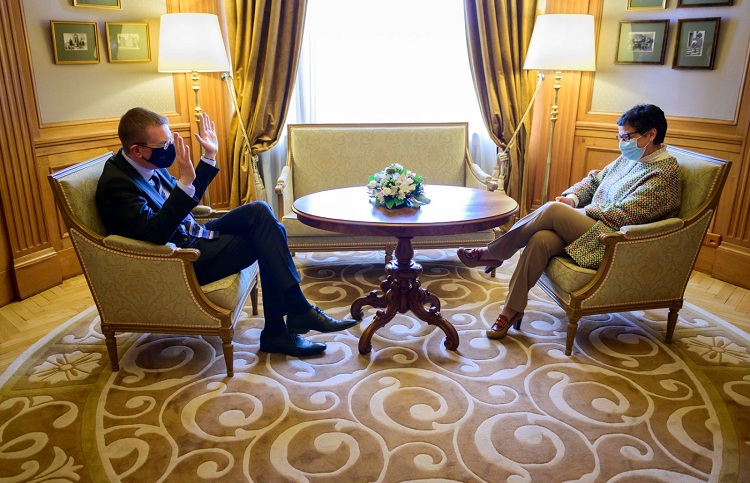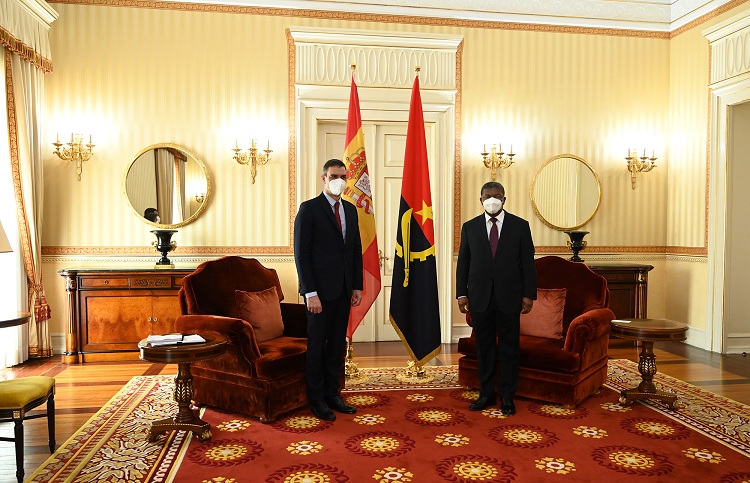Eduardo González
The Minister of Foreign Affairs, Arancha González Laya, announced yesterday during the second stage of her tour of the Baltic countries that the King and Queen of Spain could pay a state visit to Latvia “as soon as possible” depending on the agenda and the COVID-19 pandemic.
As in her previous visit to Lithuania, Spain’s involvement in the defense of NATO’s eastern flank and Russia’s latest military concentrations in eastern Ukraine were the main topics of González Laya’s visit to Riga, where she met with the President of the Republic of Latvia, Egils Levits, the Prime Minister, Arturs Krišjanis Karinš, the Speaker of the Parliament, Inara Murniece, and the Minister of Foreign Affairs, Edgars Rinkevics. In addition, the Minister held a meeting with the commanders of the Spanish Armed Forces detachment at the Adazi Base.
During the press conference following the bilateral meeting, the Latvian Foreign Minister expressed his Government’s “gratitude” for “Spain’s participation in the Latvian battle group” belonging to NATO’s Enhanced Forward Presence (EFP) (located at the Adazi Base and in which more than three hundred Spanish military personnel participate), and announced that he had conveyed to González Laya the wish that “His Majesty the King of Spain may visit Riga in the near future”.
For her part, González Laya recalled that this year marks the centenary of the establishment of diplomatic relations between the two countries, “one hundred years of constant and uninterrupted support to Latvia, in the bad and the good times”, and announced the intention of the Government to “illuminate the streets of Spain with the colors of the Latvian flag” to celebrate the anniversary. Likewise, and in reference to the previous words of his counterpart, he expressed his wish that “the future visit of the King” could take place “as soon as possible” depending on “what the agenda and the COVID-19 allow”.
As for the increased tension in the area, González Laya insisted that Spain and the EU want “a friendly relationship with Russia” in the same way that “they want friendly relations with their neighbors, with Ukraine, Belarus, Russia or Turkey, based on stability and peace”. However, as far as Ukraine is concerned, we have observed “an unusual movement of troops by Russia, although I don’t want to speculate on the reasons”, she continued. “Frankly, this is not the time to engage in additional conflicts, when we are all working to overcome the greatest crisis the world has known in a long time”, she warned. “This is the time to face the health and economic recovery after COVID”, she added.
For his part, Edgars Rinkevics warned that the “massive movement of Russian troops” and the increasing concentration of fuel and medical facilities next to these forces deployed near the Ukrainian border raise fears of a “potential aggression or an attack on any Ukrainian city”, which could lead to “a wider and unpredictable conflict.
During her previous meeting with the president, Egils Levits also thanked Spain’s “important participation” in the NATO battle group in Latvia, especially in air patrol missions, and invited Spain to participate in the activities of NATO’s Strategic Communications Center of Excellence in Riga. Also, according to the Presidency’s website, the minister and the president agreed on the need for NATO to continue to respond effectively and convincingly to security challenges.
In addition, the minister held a telematic meeting with the prime minister, with whom she discussed the fight against the pandemic and the EU’s efforts to accelerate economic recovery, and who also thanked “Spain’s commitment to security and defense in the Baltic region”, Arturs Krišjanis Karinš reported on his official Twitter account.







